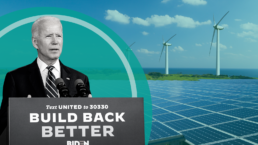“Clean energy tax credits overwhelmingly go to high-income households,” said Lucas Davis, a professor of business and economics at the University of California, Berkeley.
By Shannon Osaka, Grist
If the Build Back Better Act, Democrats’ $2.2 trillion climate and social welfare bill, passes the Senate later this month, it will come with thousands of dollars in incentives and tax credits for electric cars, solar panels, heat pumps, e-bikes, and even electric motorcycles. A family could get up to $12,500 off an electric car; the federal government would also pay for up to 30 percent of a home installation of solar panels; and individuals who purchase e-bikes could get a credit of up to $900. More than ever before, taxpayers will be incentivized to adopt low-carbon lifestyles: eschewing gas-guzzlers for electric vehicles, putting in energy-efficient windows, or even installing miniature wind turbines on top of their homes.

But will people actually use that money? Researchers say that is the big question. Existing tax credits have significant drawbacks. For one, financial incentives alone are rarely enough to get consumers to go electric or give their homes a green upgrade while low-income households face particular hurdles: Many don’t make enough money to take advantage of the tax credits, or live in rented homes that can’t be easily upgraded.
Recent Posts
These Veterans Starved Themselves To Protest The War In Gaza
July 8, 2025
Take Action Now As food in Gaza becomes increasingly scarce, activists are pushing their bodies to the limit in solidarity.By Emmet Fraizer, The…
ICE Agents Are Terrorizing Los Angeles With Brutal Tactics
July 8, 2025
Take Action Now ICE agents have established a pattern of brutal use of force in immigration raids.By Jonah Valdez, The InterceptSince June 6,…
Talk World Radio: India Walton On Zohran Mamdani And Freezing Out ICE
July 7, 2025
Take Action Now India Walton, former Democrat nominee for mayor of Buffalo, NY, discusses Zohran Mamdani and the race for NYC mayor and how to deal…
How Climate Change Is Worsening Flooding And Heavy Rainfall
July 7, 2025
Take Action Now The latest science on the link between climate change and natural disasters — and how they may be playing out where you live.By…




